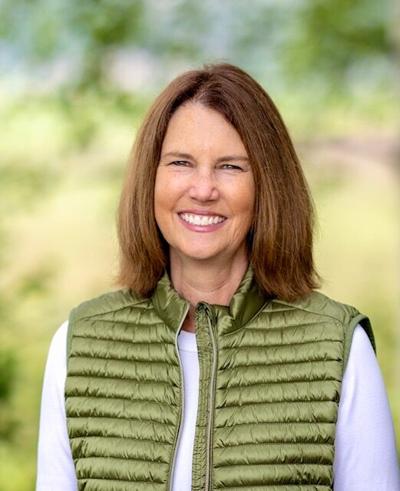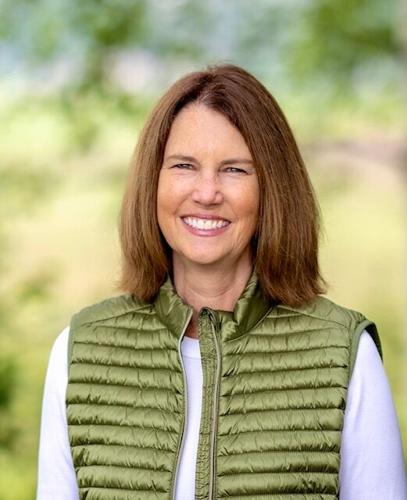Leslie Hajdukovich is a fifth-generation Alaskan running to represent Fairbanks in Senate District P.
She attended Barnette Elementary School, Tanana Middle School and West Valley High School where she played softball and volleyball and served in student government. She said her time on student government instilled the need for leaders who make good decisions and find common ground. She grew up fishing, hiking, berry picking and flying all over Alaska.
She comes from a family of aviators and gold miners. Her grandmother, Ada Wien, was one of six women elected as delegates to the Constitutional Convention. She said that her family has always been proud to be Alaskan and cared about what is happening around the state.
She attended The University of Puget Sound where she obtained a bachelor’s in business administration.
She has been married to Bob for 35 years and they have three sons together who graduated from the University of Alaska system.
She worked as a stay at home mom for many years and supported her husband’s small business. She worked as an elementary school aide and reading tutor. She served on the the Fairbanks North Star Borough Board of Education from 2007-2010 as Board President because she cared about kids and education in Fairbanks, she said.
In 2014, Hajdukovich co-chaired the successful ‘”Vote No on 1” campaign to defend a law that lowered taxes on oil companies.
She said that the law keeps taxes stable, and invited oil companies to invest in Alaska, “which was something I felt was very important for our ability to continue to live here.”
Hajdukovich said that the tax structure has been a long term investment that laid the groundwork for the Willow Project and Pikka Project.
From 2015-2019 she worked as U.S. Senator Dan Sullivan’s Fairbanks Regional Director.
Hajdukovich decided to run this year because she believes Fairbanks needs new leadership in Senate District P. She said that her experience on the school board and working for Sullivan gave her the tools she needs to help Fairbanks. She said that as a small business owner and parent, she can bring a new perspective to the Alaska Legislature.
Her top priorities are cheaper energy, education, the economy and stemming outmigration. She said she would encourage resource development and production to strengthen the state’s economy.
She enjoys spending time outdoors, skiing, duck hunting, fishing, berry picking, hiking and spending time with her husband and dogs.
What should the state’s budget priorities be?
Alaska is truly at a crossroads and we need to begin tackling real issues that matter most to families, workers and small businesses. On so many issues, I believe we need to get back to basics and work to grow our economy. Which is why I plan to focus so many of my efforts on a number of important issues, including public safety, education, roads and critical infrastructure, health, and maximizing state match opportunities to capitalize on federal dollars. This is a shared conversation, but building long-term sustainable budgets requires big picture thinking in order to solve tough issues
Education funding was a top concern in the state last session. How would you support education at the state level?
Education will be a priority for me in the next legislative session. I am a strong advocate for public education. As a former President and member of the FNSB Board of Education and volunteer in our schools, I am well prepared to roll up my sleeves to address education funding and issues facing our district and state. An increase to the BSA is long overdue. With that increase must come educational achievement and improved outcomes. We must acknowledge that our education system has changed in recent years. In addition to our traditional neighborhood schools, a growing number of parents are choosing to enroll their children in our charter schools, magnet schools, private schools and homeschool programs. An acknowledgment of this change is essential. As a state senator I would bring my education expertise to Juneau and continue to keep student learning and achievement at the forefront of educational goals.
What steps can the state take to support available housing?
Affordable and low-income housing is essential in any community and is detrimental to population growth. In addition, a dramatic increase in our senior population is exacerbating the housing shortage for this treasured generation. A review of existing federal and state housing programs for low and moderate income renters and first-time home buyers should be undertaken to ensure applicants have access to funding and aren’t overly burdened by state or federal regulatory barriers. We need to get creative on how we solve our housing needs including housing for our valued military families. I will also work to find solutions to bring cheaper energy to the interior to help bring building costs down.
What role do national culture war topics have in the Alaska Legislature?
I tend to focus more on the economy, energy issues, education, and public safety, rather than culture war topics or social issues that can divide people. I believe that everyone has a right to their opinion and I think being a leader is about finding common ground on key issues and working towards solutions. That’s what I will focus on when I am elected to the legislature.
How would you work across the aisle with other lawmakers? Would you join a bipartisan coalition?
I will work with any lawmaker no matter the party and will absolutely work across the aisle. Alaskans expect this of their elected leaders. I have a long history of working with people who have a variety of political perspectives and focuses. There have been coalitions in the state senate for years and I will work to ensure that Fairbanks has a seat at the table if that is the case. My goal is to join a Republican led organization with Fairbanks in key positions.
How should the state address outmigration and make Alaska more attractive to potential residents?
A flourishing economy, good paying jobs, excellent schools, a vibrant arts community, a healthy university, strong public safety, and a quality health care system, are all things that keep people in communities. I believe that Alaska’s high cost of living is the biggest hurdle for the interior, and working on this issue will be a priority for me. Lowering the cost of energy would make every aspect of our community stronger, thereby making the area more attractive to potential residents.
With a shortage of available natural gas in Cook Inlet and the lack of a pipeline to the North Slope, how would you address high energy costs in the Interior?
Alaska and the interior are at an energy crossroads. With the change in available natural gas in Cook Inlet, Southcentral Alaska utilities are advancing plans to import Liquified Natural Gas (LNG) to heat and power their homes and businesses. Recent economic studies show that building an in-state pipeline would be less expensive than importing LNG. Alaska has a unique opportunity to look for long term solutions like a pipeline that will help not only our largest population center, but also the Golden Heart. I will focus on solutions and partner with other leaders across the state to solve our energy needs.
What are your thoughts on ranked choice voting?
I will be voting yes on Ballot Measure 2 to repeal Ranked Choice Voting. The original intent of RCV was to reduce dark money spent in the state, increase voter engagement, offer open primaries, and encourage candidates to appeal to a wider voter base. I don’t believe RCV has done any of these things except to offer open primaries. In the traditional voting system, a person could already choose which ballot they wanted in the primary, making it at least semi-open. I also think Ranked Choice Voting is still confusing to people and is costing the state money because of the need to constantly educate citizens on how it works. I would be happy to go back to the traditional voting system.
What would you do to foster a northern rail extension?
We are a natural resource rich state in oil & gas, timber, minerals, and rare earth minerals. I am open to supporting infrastructure that aids in the environmentally safe transportation of our resources in order to promote economic development. As is the case for all projects, it needs to make practical and economic sense. Alaska is in desperate need of additional infrastructure and the northern rail extension is worthy of review.


